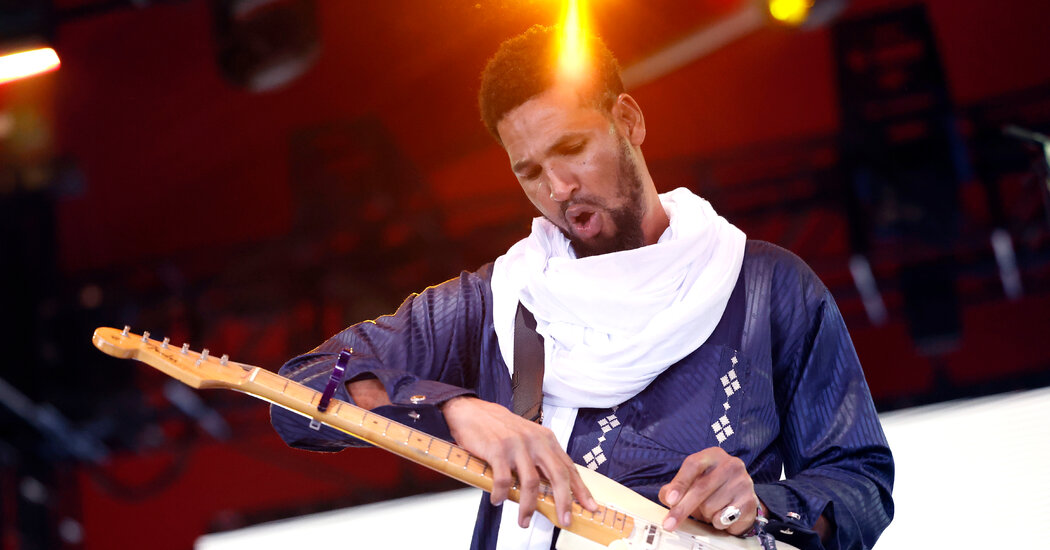Table of Contents
▶ Listen on Spotify, Apple Music or YouTube
4. Tinariwen: “Matadjem Yinmixan”
The Mali-based collective Tinariwen is part of the fabric of modern Tuareg history; its founder, Ibrahim Ag Alhabib, fled the country as a child after his rebel father was killed by government forces in an uprising. For decades now, Tinariwen has set the standard for Tuareg bands with tightly coordinated rhythms led by Ag Alhabib, whose electric guitar sometimes seems to humbly pray. “Matadjem Yinmixan,” about Tuareg unity, has a groove so locked-in it could practically be a dance hit — when I saw the band at Coachella 15 years ago, every hip under that tent was in motion.
▶ Listen on Spotify, Apple Music or YouTube
5. Bombino: “Tar Hani”
A Nigerien musician of roughly the same generation as Mdou Moctar, Bombino has also made inroads in the American rock world, recording with members of the Black Keys and Dirty Projectors. And he shreds, for sure, though Bombino is a subtler stylist than Moctar, here calling to mind lyrical players like Ry Cooder.
▶ Listen on Spotify, Apple Music or YouTube
6. Orchestra Baobab: “Coumba”
In the 1970s and ’80s, this Senegalese band epitomized a fascinating kind of cultural transfer that had crisscrossed the Atlantic: musicians in Africa absorbing and refracting Afro-Cuban dance styles that had originally descended from enslaved Africans in the New World. Led by the guitarist Barthélémy Attisso, who made complex arpeggiated runs sound as simple and joyful as a mambo step, Orchestra Baobab had a seemingly bottomless repertoire of sweetly melodic, irresistibly breezy tracks like “Coumba.” Seeing them play in Central Park on a perfect summer day in 2002 is a cherished memory for me.
▶ Listen on Spotify, Apple Music or YouTube
7. Sir Victor Uwaifo: “Igboroho (Ekassa 5)”
A Nigerian polymath, Uwaifo was never a star on the level of Fela Kuti or Oliver Mtukudzi, although he did tour the West, reaching the Village Vanguard in New York in 1970. In the 2000s his work was rediscovered and anthologized, and it’s eccentric and vibrant, with touches of vintage African highlife style, raw R&B and some wild-man guitar solos. This track is one of a series based on a traditional coronation dance called an ekassa, though in notes to a reissue Uwaifo describes it as a song by construction workers, “meant to serve as a warning that if the client doesn’t pay them, then the house will fall down.”
▶ Listen on Spotify, Apple Music or YouTube
8. Djelimady Tounkara: “Fanta Bourama”
One of Africa’s most admired guitarists, the virtuosic Tounkara was the longtime lead player in the Rail Band (a.k.a. Super Rail Band), a popular Malian group that, like Orchestra Baobab, was born out of Africa’s midcentury craze for Latin music. On this sparkling acoustic track, Tounkara plays a romantic, flamenco-style lead, showing off his chops for a solid minute and a half before the vocals come in; he could have gone on forever.
▶ Listen on Spotify, Apple Music or YouTube
9. Fela Kuti and Africa 70: “Zombie”
A titan of 20th-century African culture, Kuti was a musical and political revolutionary who used the unruly power of his huge funk band in challenging Nigeria’s military government in the 1970s. Brawny horns take the melodic center stage in most of Fela’s music, though he makes highly effective use of guitars as a kind of percussion element, as James Brown did. Led by Oghene Kologbo, Fela’s guitarists on “Zombie” — a mocking censure of soldiers blindly following orders — play a sequence of continuously interlocking riffs, like wheels that never stop turning.


